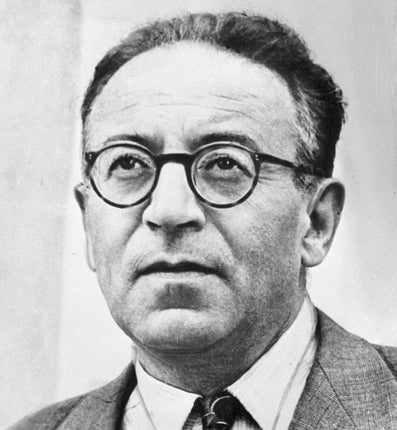Censored by Soviets, lionised by Radio 4
Station controller commissions eight-hour dramatisation of his beloved 'Life and Fate'

When the writer Vasily Grossman died from stomach cancer in 1964, he was 58 years old and totally impoverished. His magnum opus, Life and Fate, had never been published.
Indeed, not only had the work not made it into print, but the manuscripts had been seized by the KGB, along with the carbon copies, the author's original notebooks, the typists' copies, and even the ribbons from the typewriters themselves. When, two years before his death, Grossman pleaded for Life and Fate to be released by the censor he was told by a Soviet state official that it would be too dangerous to publish it for at least 200 years.
Life and Fate is to be made the subject of the most ambitious dramatisation in the history of BBC Radio; around eight hours in length and broadcast over seven days next year. The BBC intends to hire a "star-studded cast" for the dramatisation by Mike Walker and Jonathan Myerson, husband of the novelist Julie.
Life and Fate is a passion of Mark Damazer, the controller of Radio 4, who said he has three personal copies of the novel. "I always like to have a copy near me and I have given away about 15 to friends," he said. "It's a superlative piece of writing and is not remotely as well-known as it needs to be. I feel it is worth making the big statement about."
The BBC hopes to obtain rights to provide the full eight-hour drama in podcast format. It is belated recognition for a work considered by some literary experts to be the greatest Russian novel of the 20th century, though it remains largely unknown in this country.
The book's history is almost as remarkable as the epic tale contained in its 871 pages, and is loosely based on the battle of Stalingrad.
The novel only came to be published at all because a copy of the manuscript had been hidden away in a farmhouse outside Moscow where, 10 years after Grossman's death, his best friend, Semyon Lipkin, secretly transferred it on to microfilm. Months later, two dissidents, the satirical writer Vladimir Voinovich and the nuclear scientist Andrei Sakharov, smuggled the film out of the Soviet Union.
Life and Fate, which informed the feature film Enemy at the Gates, was eventually published for the first time in 1980, and was translated into English in 1985 by Robert Chandler, who said he found it surprisingly difficult to put down. "Grossman's descriptions of the fighting at Stalingrad are extraordinarily vivid," Mr Chandler said yesterday. "I sense a powerful intelligence behind the comparisons between Nazism and Stalinism. And the last letter written by the hero's mother from a Jewish ghetto in Ukraine, before her death in a Nazi massacre, was as moving as anything I had ever read."
That is probably because it was inspired by the loss of Grossman's own mother, massacred by the Germans. The author's story is also extraordinary. A Ukrainian Jew, he trained as an engineer but began writing short stories and then, when the Nazis invaded the Soviet Union in 1941 he became a war reporter for the Red Army newspaper. He was present at the battles of Moscow, Stalingrad and Kursk, and his report The Hell of Treblinka was one of the first eyewitness accounts of the Holocaust.
The historian Antony Beevor, who co-edited Grossman's diaries and the reports he wrote for the book A Writer at War, said: "He combined moral courage with physical courage. During the war, he proved himself to be extremely brave and even though he was the archetypal Moscow Jewish intellectual, it was amazing how the soldiers trusted him straight away because they could see he was not like other Soviet war correspondents who were just following the party line."
The central character in Life and Fate is a partly-autobiographical figure, Viktor Shtrum, and the novel draws on Grossman's own experiences of war and genocide, of the struggle of human goodness in the face of totalitarianism. Its ultimate theme – expressed in the last lines of the book – being that, in spite of such horror, life somehow goes on.
"You could hear both a lament for the dead and the furious joy of life itself. It was still cold and dark, but soon the doors and shutters would be flung open. Soon the house would be filled with the tears and laughter of children, with the hurried steps of a loved woman and the measured gait of the master of the house. They stood there, holding their bags, in silence."
Subscribe to Independent Premium to bookmark this article
Want to bookmark your favourite articles and stories to read or reference later? Start your Independent Premium subscription today.

Join our commenting forum
Join thought-provoking conversations, follow other Independent readers and see their replies